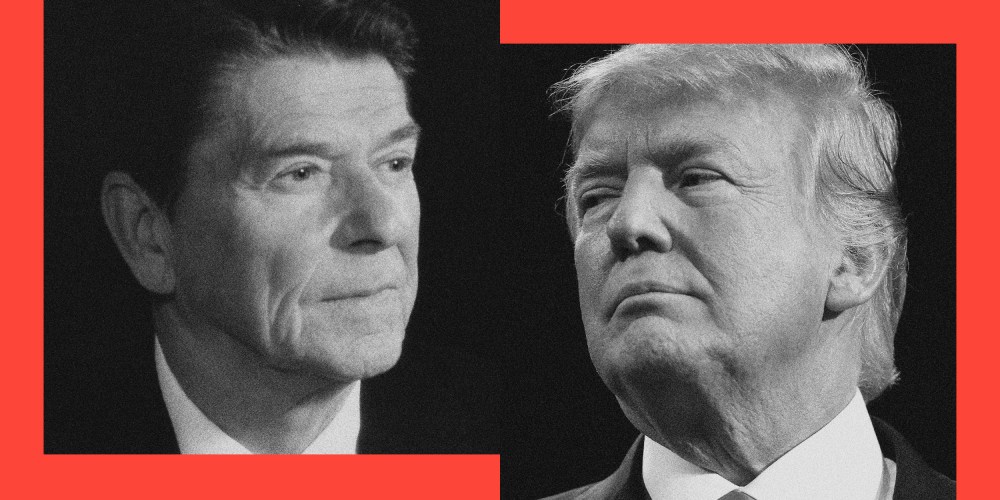Sen. Tom Cotton, R-Ark., argued Monday night that former Presidents Ronald Reagan and Donald Trump were essentially cut from the same cloth. “For all their differences in temperament and style,” he asserted in his speech at the Reagan presidential library, “there’s a deeper continuity in the beliefs of our 40th and 45th presidents.”
Cotton declined to “sketch out the similarities with great details about policies and programs.” Instead, he noted that both men adorned the walls of the Oval Office with paintings of President Andrew Jackson and thus both were, at heart, Jacksonian populists. It’s a rather weak case, but there is one to be made linking Reagan and Trump — just, perhaps, not the one Cotton intended.
The senator is correct that Reagan and Trump displayed starkly different temperaments and styles. As president, Reagan projected a sense of sunny optimism. His first inaugural address encouraged Americans to “dream heroic dreams” in support of “national renewal,” while his re-election campaign confidently declared it was “morning again in America.”
There is a case to be made linking Reagan and Trump — just, perhaps, not the one Cotton intended.
Trump, in sharp contrast, consistently presented an uglier and more pessimistic perspective. His inaugural address rattled off a list of grievances and grudges that constituted a dire state of “American carnage.” That dark and dismal tone for Trump’s inaugural — which a bewildered former President George W. Bush could only describe as “some weird s—” — only deepened as his administration wore on.
These presidents’ personalities were, in turn, projected on the nation they led. But while these stylistic differences are important, they ultimately matter less than the shared legacies of the two presidents.
The populist tradition is a long one in American history. Rather than reach all the way back to Jackson in the 1830s as Cotton did, we can find a more recent and more relevant example in the 1960s campaigns of George Wallace.
As many historians (including me) have noted, Trump’s political campaigns bore an eerie resemblance to the wild rallies that Wallace staged in the ‘60s. Like Jackson before him and Trump after, Wallace championed the cause of “the common people,” largely by stoking their sense of victimization and promising to exact revenge on the source of their resentment.

Reagan sits well within that tradition, too. During the 1960s and 1970s, as a surrogate for presidential candidate Sen. Barry Goldwater, R-Ariz., and then as a two-term governor of California, he sounded many of the same themes as Wallace in private and in public. Reagan pressed the precise “law and order” message that Wallace pioneered, for instance. He also used the same kind of racist dog whistles, including exaggerated stories about a “Chicago welfare queen” and a “strapping young buck” who used food stamps to “buy a T-bone steak.”
Little wonder that contemporaries saw the two men as linked. After Watergate seemingly ruined the Republican brand, National Review publisher William Rusher suggested starting over with a new Conservative Party — one led by a Reagan-Wallace presidential ticket.
“Reagan’s dirty little secret is that he has found a way to make racism palatable and politically potent again.”
Most notoriously, Reagan launched his general election campaign in 1980 with a visit to Philadelphia, Mississippi — the infamous site where three civil rights activists were killed in 1964, with the local police’s complicity. “I believe in states’ rights,” Reagan told the lily-white crowd. Such a “states’ rights” appeal, civil rights legend Andrew Young noted, was simply “the electoral language of Wallace, Goldwater and the Nixon southern strategy.” A Mississippi Republican admitted as much: The speech, he told reporters, was an effort to win over “George Wallace inclined voters.”
As president, Reagan continued in this vein, opposing affirmative action and busing programs while fighting to save tax exemptions for racially segregated schools. The reality of his stance on racial issues was, for many, obscured by the president’s cheery disposition. In a scathing article in The Nation titled “Smiling Racism,” civil rights activist and Pulitzer Prize-winning journalist Roger Wilkins laid it bare: “Reagan’s dirty little secret is that he has found a way to make racism palatable and politically potent again.”
Of course, while civil rights leaders recoiled from Reagan’s racial record, those “George Wallace inclined voters” were drawn in by the same words and deeds. Rep. Trent Lott, R-Miss., told a convention of the Sons of Confederate Veterans that “the spirit of Jefferson Davis lives in the 1984 Republican platform.” Even Trump’s white nationalist supporters have been more subtle.













